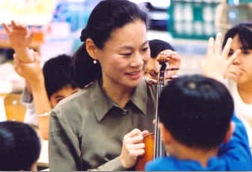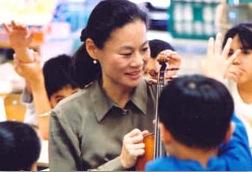What is the story behind using your first name only as your stage name?
When I first began performing in the United States, journalists here would often mistake my name to be Mi Dori. There are some old articles in which you can find references to me as “Miss Dori.” Though it was eventually corrected in the press, my surname (Goto) had not been mentioned for so long that I came to be known professionally as simply Midori.
How do you find living as an artist on the West Coast, as opposed to the East Coast where you used to live?
Spending 20-plus years in New York allowed me to take advantage of the city’s many opportunities to experience diverse arts and music, particularly as a teenager and young adult. In L.A., I find myself becoming more fascinated and involved with what is available here as I am approaching the fifth year of my residency. I think what makes my life in California different is the type of institution I am teaching in — I used to work in a conservatory, and now I am teaching in a university [as Strings Department chair at University of Southern California’s Thornton School of Music]. This in itself is quite a change, and I like it.
How does your master’s degree in psychology manifest itself in your teaching or performing?
The influence of my college experiences turns up in all realms of my life, including performing and teaching. I believe that the whole of my experiences and knowledge is reflected in my playing and musical interpretations, though not necessarily in a concrete or traceable way. I certainly do not attempt to psychoanalyze my students’ behaviors or personalities. I try to give my students a balance between their actual violin studies and an awareness of the incentives in their lives.
You are presenting a recital of new works at San Francisco Performances on Feb. 6. Do you find yourself increasingly drawn to performing modern music at this point in your career?
Contemporary music has been a presence in my musical studies from an early age, and that familiarity helped to deflect most of the usual inhibitions about contemporary music. As I began to take those studies more seriously, it was clear to me how important it is to support contemporary works and composers. Today’s music reflects the current world, and can provide great insight and social commentary for its audiences. I am fortunate to have had the opportunity to do multiple all-contemporary recital tours, though it is not always easy to include such pieces in regular concert programming.
Are there any concert engagements that you’re particularly looking forward to this year?
Although it might sound like I’m giving you a diplomatic answer, the honest truth is that I look forward to everything I do, from concerts and rehearsals to lessons and community activities. Every new experience is special and valuable as personal growth, and it’s a pleasure to encounter so many interesting people along the way.

What sorts of activities are you engaged in as a UN Messenger of Peace?
My main area of focus is youth. I intend to increase awareness of issues surrounding children, as well as making children aware of the issues we face in this world, particularly those that touch them directly. Case in point: my Music Sharing program, based in Japan, sponsored a community engagement trip to Mongolia last month with several young musicians from around the world. As we have done with past International Community Engagement Programs (Indonesia, Cambodia, Vietnam), this summer we will visit schools, institutions, and organizations in Japan, to share our experiences with the Japanese public, particularly children, juxtaposing the rich cultural history of Mongolia with some of the current issues faced by its disparate social classes.
In the context of music, we can bring up sensitive social topics such as poverty and hunger without pretense or judgment. The UN’s expectation is that we incorporate the messages of the Millennium Development Goals into our existing work, thereby helping the world become a better place.
Your work with your educational foundations is so extensive. What is your focus for 2010?
The focus for my nonprofit organizations and projects, as always, is to advance our particular missions and to find improved ways of doing so. Amazingly, all three organizations will celebrate significant anniversaries in the 2012/2013 season, coinciding with the 30th anniversary of my debut: Midori & Friends will be 20 years [old], and Music Sharing and Partners in Performance will be 10 years. We are starting to think about special activities and celebrations for this milestone season, and it will be very exciting to see it all come to fruition.
With all of those international activities, do you have time for much of a home life, and if so, what form does that take?
Home, to me, is teaching; the comfort and internal alignment I feel while teaching lets me know that where I am is where I want to be. It is no small coincidence that my primary physical residence is in the city where I spend the most hours teaching.
If you made a New Year’s resolution, what would it be?
To be open to the unpredictability of life and all its challenges, without the confinement of expectations ... or resolutions!

